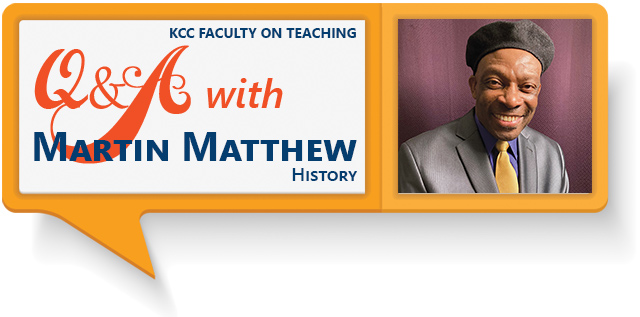KCC Faculty on Teaching
KCC Faculty on Teaching

How did you get into teaching?
My first teaching experience came after completing high school. I taught at a Roman
Catholic elementary school for two years. The following year I received a full scholarship
to attend the University of Havana and Camaguey in Cuba, where I did some tutoring.
After graduate school, I was offered a position by Touro College to teach several
courses in history and political science, and later by the college of New Rochelle,
where I taught history and political science for several years before joining the
history department at Kingsborough Community College.
What career did you imagine for yourself when you were in college?
At the University of Havana, I studied agronomy but realized it was not an area I
wanted as a career. Another thought was being an air traffic controller, but I decided
against it and settled for economics. I study Economic Planning at the University
of Havana and Camaguey for three years. After graduating with a bachelor's in economics,
I went to graduate school to study history and political science. Political science
I knew well because I had worked with the government and witnessed firsthand how the
government operated. However, my great love for history was a deciding factor.
What do you love about teaching?
I love making a difference in students' lives and inspiring them to make a difference
in this universe. At Touro and the College of New Rochelle, students have written
letters and made telephone calls explaining how I have contributed to their success.
Students at Kingsborough are the most inspiring. I have past students who tell me
I have changed their lives. Some students demand that other family members take African
American and Caribbean classes. Others have reported how those classes changed their
perspective and major; some went on to law schools. Teaching is my passion. It is
the field that truly keeps on giving. Many students speak about the knowledge received
from African American, Caribbean, and political science classes. This makes teaching
a grateful career because I am contributing to the learning and the advancement of
humanity.
What's your favorite teaching experience?
I had some students who went to Africa because they took the African American class.
After taking the Caribbean class, some went to Europe to see how the Caribbean contributed
to building multiple European cities. Another exciting experience was an invitation
by Haitian American and other Caribbean American students to speak at their church
and conventions.
In what ways do you bring your professional experience into the classroom?
I share my struggles growing up and where I am today and encourage them to do the
same or better. I firmly believe that students should focus on making a difference
in this universe and people's lives by using their professional skills, rather than
concentrating on monetary value. I encourage students to apply historical information
to their current conditions to solve complex problems and find the right approach
to solve those situations.
What advice do you have for current students?
I want current students to remember that most of the greatest inventions and realizations
did not occur immediately. These advances came about through prolonged, extensive,
and collaborative efforts after several years of attempts and failure. Most humans
are impatient for long-term rewards and concentrate on short-term immediate gratification.
Make sure you have a purpose in life, and make that purpose meaningful and part of
a whole. Don’t look for immediate gratification and quick solutions, and try not to
be impatient. Work and study hard and learn thoroughly and comprehensively. Do not
accept mediocre conditions; strive for excellence and be the best you can be. Whatever
area you have decided for your career, be the best at it. Also, do not let money be
your motivator in life. Focus on what you can do to change the world and make a difference
in this universe with your career.
